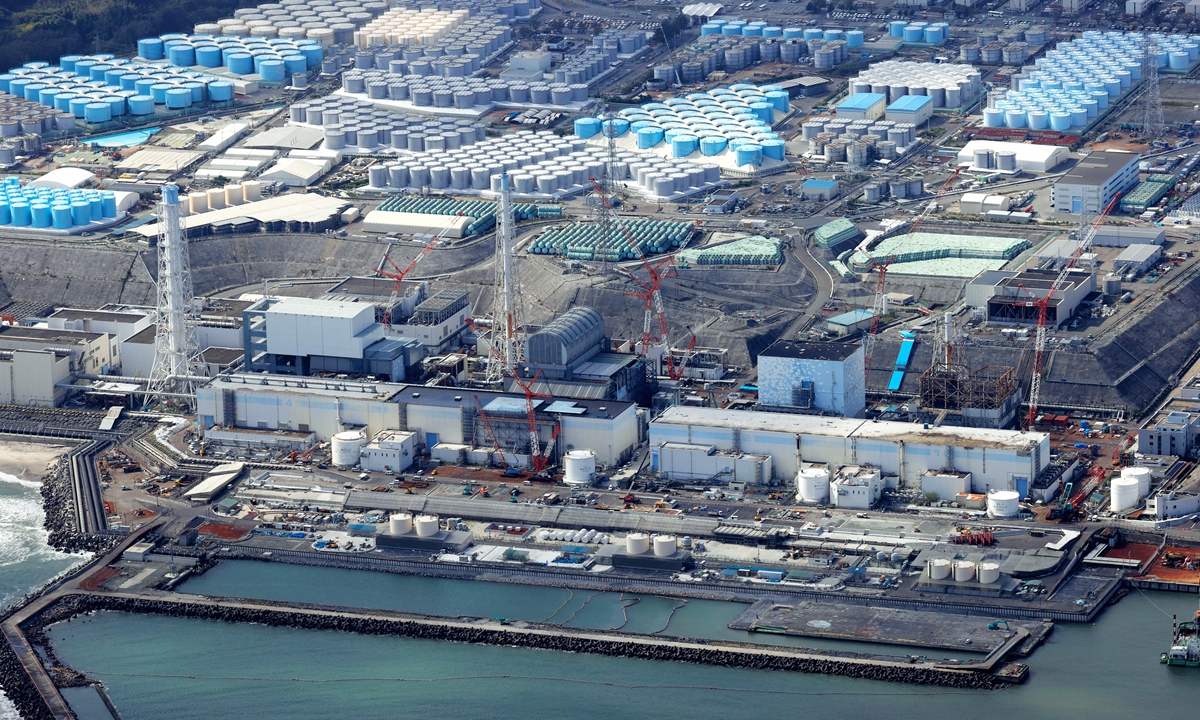Japan urged to work with intl community over nuclear-contaminated water

A file photo shows containers of nuclear-contaminated water at the Fukushima nuclear plant in Japan on October 16, 2020. Japan's nuclear regulator on July 22, 2022 approved the dumping of the water into the sea, despite international concerns and protests. Photo: VCG
Japan should attend to the serious concerns of the international community about the dumping of contaminated water into the ocean from the Fukushima nuclear power plant, experts said. It comes as Japan seeks understanding from Pacific island nations who sent a delegation to Tokyo this week to voice their concerns.
According to Kyodo News, Japanese Foreign Minister Yoshimasa Hayashi on Wednesday tried to seek understanding from Kitlang Kabua, minister of foreign affairs and trade of the Republic of the Marshall Islands, about Japan's plan to discharge the contaminated water from the Fukushima nuclear power plant into the Pacific.
Kabua came to Japan as a member of the Pacific Islands Forum (PIF), a high-level political and economic policy organization comprising 18 member countries across the south Pacific region. Kabua said nuclear contamination continues to be a real and grave threat to the Pacific, which the Pacific takes seriously and is legally bound to prevent.
One day earlier, Mark Brown, the incoming Forum chair and prime minister of the Cook Islands, met Japanese Prime Minister Fumio Kishida and expressed concerns. Brown also presented a request from Pacific leaders for a deferral of Japan's discharge plan, the Cook Island News reported.
Japan has agreed to delay the discharge of treated nuclear wastewater into the Pacific Ocean until PIF experts verify it is safe to do so, RNZ Pacific reported after quoting a PIF delegation statement.
But the official statement from the Japanese side seemed different. Without mentioning postponing the dumping plan, both Kishida and Hayashi said the discharge will not be allowed in a manner that endangers human health and the marine environment, according to Japan's Foreign Ministry.
Experts said the PIF delegation's visit to Japan is not a surprise as Japan's dumping of nuclear-contaminated water into the Pacific will directly damage both their environment and production means such as fisheries.
The Pacific island nations are urgently trying to stop Japan's irresponsible decision, reflecting the concerns of the international community, Chen Hong, president of the Chinese Association of Australian Studies and director of the Australian Studies Centre at East China Normal University, told the Global Times on Thursday.
As the Japanese side didn't clearly say if it will delay the discharge, Japan should attend to calls from people living in the Pacific region, Chen said. "We are very disappointed that Japan has made no change of its discharge plan so far. If Japan is willing to work with the international community over dealing with the nuclear-contaminated water, I think we will support Japan and help it to solve the problem."
The Japanese government gave an estimate for when the water from the crippled Fukushima No. 1 nuclear power plant will be released into the sea, saying at a cabinet meeting on January 13 that it could happen sometime "around this spring or summer." In April 2021, the government approved the release into the ocean of more than 1 million tons of irradiated water after treatment.

